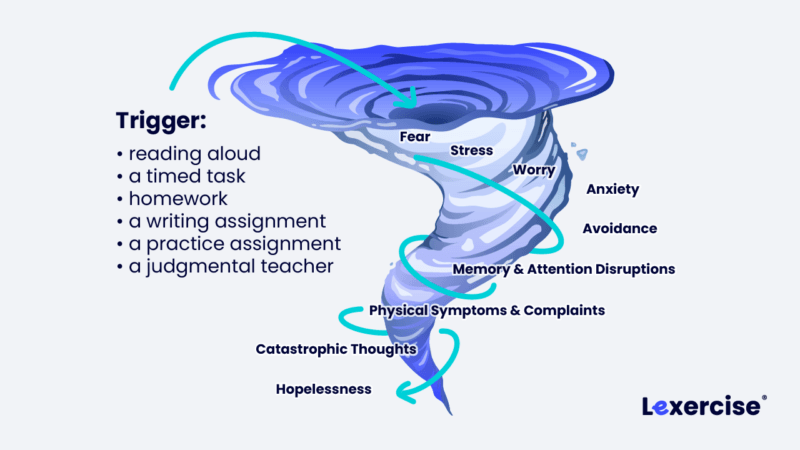The Vortex of Dyslexia
Written by Sandie Barrie Blackley, MA/CCC
Published on April 10, 2024
For dyslexic children, what begins as an educational problem can quickly descend into an emotional problem. School reading or writing assignments may serve as triggers for intensely negative emotions of fear, stress, and anxiety, which in turn lead to memory and attention disruptions, which lead to physiological manifestations of that unease—and in some cases, catastrophic thoughts. By considering these cascading effects, we can understand why depression and, sadly, suicide rates for dyslexic children are higher than for the general population.
Dyslexia’s Emotional Impact
This sort of cycle is well-known in psychology, with the “anxiety cascade” being taught over many decades, even in basic psychology courses. The diagram included in this article adapts that cycle to specifically address the pattern observed in dyslexic children.
 Because of this “Vortex of Dyslexia,” early intervention for children is critical. Dyslexia is in many ways an invisible struggle. If dyslexic children are not properly evaluated and treated what may seem to outsiders as “simple” reading and writing difficulties can grow into far more significant psychological or physiological problems.
Because of this “Vortex of Dyslexia,” early intervention for children is critical. Dyslexia is in many ways an invisible struggle. If dyslexic children are not properly evaluated and treated what may seem to outsiders as “simple” reading and writing difficulties can grow into far more significant psychological or physiological problems.
Unfortunately, many of the parents we hear from have learned this painful lesson firsthand. Many of them reach out to Lexercise months or years after they first detected signs of dyslexia in their child. Typically, these parents hoped and expected that their child’s public school would address the problem, but it didn’t–even after years of waiting. By then, children have often transitioned from enjoying school to dreading it, from being confident in their abilities to fearing they’re “dumb.” Attention and motivation problems often begin, as well.
If your child is a beginning reader you can screen them for dyslexia for free in 10 minutes here. If you are concerned that your child is experiencing a “vortex” of emotions related to reading, writing, and spelling you can reach out to a Lexercise Therapist to learn more about how you can help. Or you can call us at 1-919-747-4557.
Additional Resources
Helland, S. S., Røysamb, E., Brandlistuen, R. E., Melby-Lervåg, M., & Gustavson, K. (2020). A Common Family Factor Underlying Language Difficulties and Internalizing Problems: Findings From a Population-Based Sibling Study. Journal of Learning Disabilities, 53(5), 399–409.
Horbach, J. Mayer, A., Scharke, W., Heim, S. & Günther, T. (2020) Development of Behavior Problems in Children with and without Specific Learning Disorders in Reading and Spelling from Kindergarten to Fifth Grade, Scientific Studies of Reading, 24:1, 57-71, DOI: 10.1080/10888438.2019.1641504
McArthur, G., Badcock, N., Castles, A., & Robidoux, S. (2021). Tracking the Relations Between Children’s Reading and Emotional Health Across Time: Evidence From Four Large Longitudinal Studies. Read Res Q, 00(00), 1– 31.
Vaughn, S., Grills, A. E., Capin, P., Roberts, G., Fall, A.-M., & Daniel, J. (2021). Examining the Effects of Integrating Anxiety Management Instruction Within a Reading Intervention for Upper Elementary Students With Reading Difficulties. Journal of Learning Disabilities.
4 Responses to The Vortex of Dyslexia
-
Is it possible you could email mr the vortex document
-
Are there organizations that help adult dyslexia?
Improve Your Child’s Reading
Learn more about Lexercise today.
Schedule a FREE
15-minute consultation



Answer to every hurting, crushed Dyslexic child and their parents / love ones.